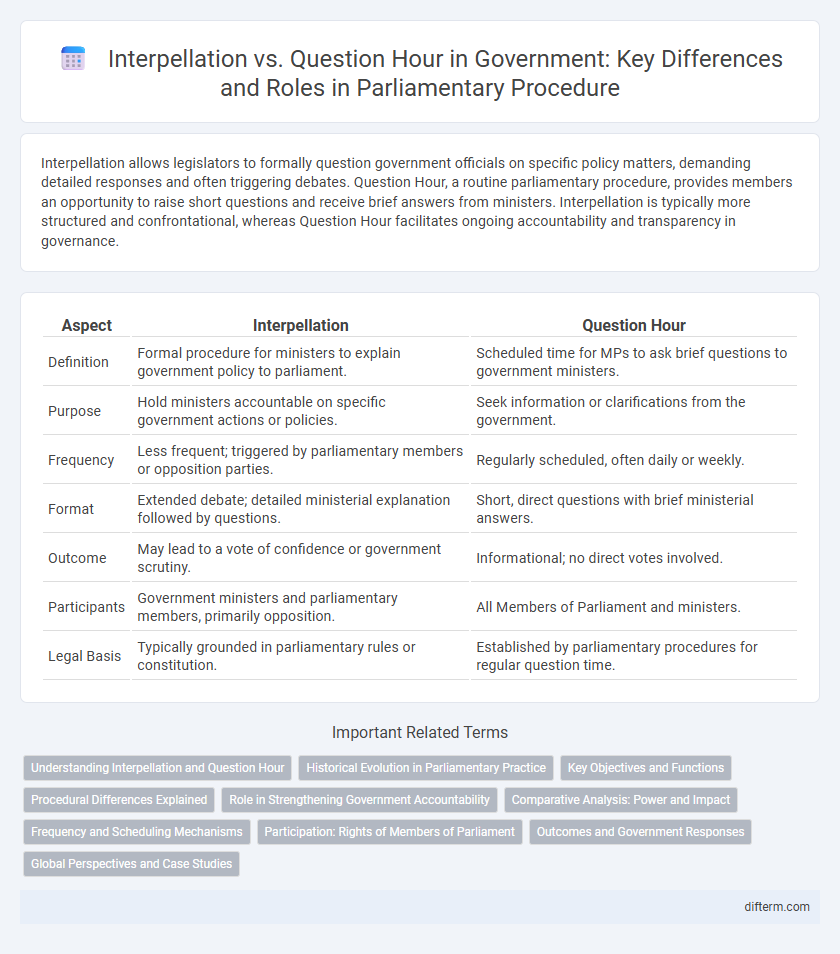Interpellation allows legislators to formally question government officials on specific policy matters, demanding detailed responses and often triggering debates. Question Hour, a routine parliamentary procedure, provides members an opportunity to raise short questions and receive brief answers from ministers. Interpellation is typically more structured and confrontational, whereas Question Hour facilitates ongoing accountability and transparency in governance.
Table of Comparison
| Aspect | Interpellation | Question Hour |
|---|---|---|
| Definition | Formal procedure for ministers to explain government policy to parliament. | Scheduled time for MPs to ask brief questions to government ministers. |
| Purpose | Hold ministers accountable on specific government actions or policies. | Seek information or clarifications from the government. |
| Frequency | Less frequent; triggered by parliamentary members or opposition parties. | Regularly scheduled, often daily or weekly. |
| Format | Extended debate; detailed ministerial explanation followed by questions. | Short, direct questions with brief ministerial answers. |
| Outcome | May lead to a vote of confidence or government scrutiny. | Informational; no direct votes involved. |
| Participants | Government ministers and parliamentary members, primarily opposition. | All Members of Parliament and ministers. |
| Legal Basis | Typically grounded in parliamentary rules or constitution. | Established by parliamentary procedures for regular question time. |
Understanding Interpellation and Question Hour
Interpellation is a formal procedure allowing legislators to demand detailed explanations from government ministers on specific policies or decisions, promoting accountability within parliamentary systems. Question Hour refers to a designated period during legislative sessions when members ask oral questions to ministers, facilitating immediate responses and public scrutiny of government actions. Both mechanisms serve as essential tools for legislative oversight, with interpellation often requiring a structured debate, while Question Hour encourages rapid information exchange.
Historical Evolution in Parliamentary Practice
Interpellation and Question Hour have evolved as critical mechanisms in parliamentary practice to hold governments accountable, with interpellation emerging in the 19th century as a formal request for government explanation on specific policies. Question Hour, developing later, institutionalized daily sessions allowing members to directly question ministers, enhancing transparency and responsiveness. The historical evolution reflects a shift from occasional scrutiny to routine parliamentary oversight, strengthening democratic governance.
Key Objectives and Functions
Interpellation serves as a formal procedure allowing legislators to question government ministers directly, ensuring accountability on specific policies or actions. Question Hour provides a daily forum where elected representatives pose brief questions to ministers, facilitating transparency and immediate responses on pressing issues. Both mechanisms function to maintain government responsibility, though interpellation involves detailed scrutiny while Question Hour promotes timely information exchange.
Procedural Differences Explained
Interpellation in government involves formal requests for detailed explanations from ministers, typically requiring written responses and allowing extended debate, while Question Hour features shorter, oral questions aimed at clarifying immediate issues without necessitating comprehensive written answers. Interpellations are scheduled in advance, follow strict procedural guidelines, and often lead to in-depth discussions, contrasting with the more spontaneous, rapid-fire nature of Question Hour sessions. These procedural distinctions ensure that interpellations facilitate thorough accountability, whereas Question Hour provides timely scrutiny of government actions.
Role in Strengthening Government Accountability
Interpellation empowers legislators to formally question government ministers, demanding detailed explanations on policy implementation, thereby enhancing transparency and executive accountability. Question Hour allows members of parliament to raise oral questions directly, facilitating real-time scrutiny of government actions and decisions. Both mechanisms play crucial roles in parliamentary oversight, ensuring the government remains answerable to elected representatives and the public.
Comparative Analysis: Power and Impact
Interpellation in government allows parliament members to formally summon ministers for detailed explanations on policy matters, wielding significant oversight power that can prompt accountability and corrective actions. Question Hour, while also facilitating ministerial scrutiny, is generally more routine and less formal, focusing on brief, targeted queries that address immediate concerns without necessarily triggering in-depth investigations. The comparative impact reveals interpellation as a stronger tool for exerting pressure on the executive, whereas Question Hour promotes transparency and responsiveness within regular legislative operations.
Frequency and Scheduling Mechanisms
Interpellation sessions occur less frequently and are scheduled based on parliamentary discretion, allowing detailed examination of specific government actions. In contrast, Question Hour is held regularly on a daily basis during parliamentary sittings, providing a structured and routine opportunity for members to seek brief clarifications from ministers. The differing frequencies and scheduling mechanisms reflect the distinct purposes and procedural flexibility of these parliamentary tools.
Participation: Rights of Members of Parliament
In parliamentary systems, Interpellation grants Members of Parliament (MPs) the right to formally question government ministers on specific policies or actions, often leading to detailed debates and requiring comprehensive responses. Question Hour allows MPs to raise shorter, spontaneous questions, focusing on immediate government accountability, with the right to seek clarifications and prompt answers. Both mechanisms ensure active participation by MPs, reinforcing their oversight role and promoting transparent governance.
Outcomes and Government Responses
Interpellation enables detailed scrutiny by allowing legislators to demand comprehensive explanations and justifications from government officials, often resulting in formal responses and potential policy adjustments. Question Hour provides a regular platform for quick and direct inquiries, facilitating immediate government accountability and clarifications on current issues. Together, these mechanisms enhance transparency and responsiveness, influencing legislative debates and decision-making processes.
Global Perspectives and Case Studies
Interpellation and Question Hour represent critical parliamentary tools for government accountability, with interpellation allowing members to formally question ministers on specific policies, as observed in countries like France and Germany. Question Hour, prevalent in parliamentary systems such as India and the United Kingdom, offers a regular, structured opportunity for legislators to seek information and hold the executive branch accountable. Case studies reveal that while Interpellation induces detailed debates and ministerial explanations, Question Hour facilitates immediate responses, enhancing transparency and responsiveness in governance.
Interpellation vs Question Hour Infographic

 difterm.com
difterm.com